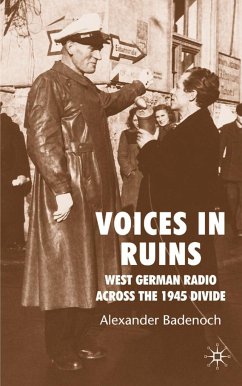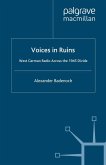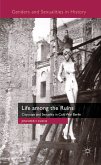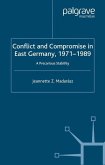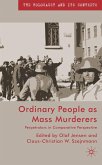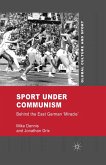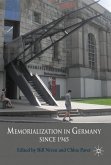Immediately after the Second World War, the radio was the best-preserved medium of mass communication in Germany. This book explores the implications of this dominance by asking how everyday broadcasting constructed ideas of 'normal' times, people and places in the destroyed, divided and occupied zones of what would become the Federal Republic.
Co-winner of the IAMHIST prize for the best work of media and history in the years 2007 -2008
'Sophisticated in its theoretical framework and presenting new empirical research, Badenoch's fascinating study demonstrates the crucial role radio played in rebuilding everyday domestic normality in post-World War II Germany. In this respect, and in negotiating cultural, social, and institutional ruptures as well as continuities, broadcasting became one of the most significant tools in shaping a new sense of national identity after 1945. Badenoch's work is innovative, stimulating, interdisciplinary - and as inclusive and multigeneric as the medium he discusses.' - Professor Tim Bergfelder, University of Southampton, UK
'Rooted in exhaustive archival research, this book provides a first comprehensive English-language overview of the development of West German radio as a mass popular medium in the aftermath of World War II. Compellingly and lucidly written, the book tells a multifaceted story of radio as institution, mass media technology and soundscape of everyday life. Charting the medium's history across a broad range of fields, this densely-layered and illuminating account is set to become essential reading for scholars of postwar German cultural history, as well as media historians and cultural studies researchers seeking an authoritative history of a medium emerging from the ruins of world war.' - Professor Erica Carter, University of Warwick, UK
'The Author...has brought together an enormous wealth of material, from manuscript and sound documents, contemporary statements from programmers and interviews, as well as seemingly marginal sources...From these mosiac stones he constucts interconnected themes step-by-step, and so driven by curiosity pursues his main thesis about normality in times of crisis and fragmentation.' - H-Soz-u-Kult
'Sophisticated in its theoretical framework and presenting new empirical research, Badenoch's fascinating study demonstrates the crucial role radio played in rebuilding everyday domestic normality in post-World War II Germany. In this respect, and in negotiating cultural, social, and institutional ruptures as well as continuities, broadcasting became one of the most significant tools in shaping a new sense of national identity after 1945. Badenoch's work is innovative, stimulating, interdisciplinary - and as inclusive and multigeneric as the medium he discusses.' - Professor Tim Bergfelder, University of Southampton, UK
'Rooted in exhaustive archival research, this book provides a first comprehensive English-language overview of the development of West German radio as a mass popular medium in the aftermath of World War II. Compellingly and lucidly written, the book tells a multifaceted story of radio as institution, mass media technology and soundscape of everyday life. Charting the medium's history across a broad range of fields, this densely-layered and illuminating account is set to become essential reading for scholars of postwar German cultural history, as well as media historians and cultural studies researchers seeking an authoritative history of a medium emerging from the ruins of world war.' - Professor Erica Carter, University of Warwick, UK
'The Author...has brought together an enormous wealth of material, from manuscript and sound documents, contemporary statements from programmers and interviews, as well as seemingly marginal sources...From these mosiac stones he constucts interconnected themes step-by-step, and so driven by curiosity pursues his main thesis about normality in times of crisis and fragmentation.' - H-Soz-u-Kult

